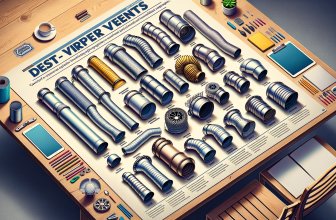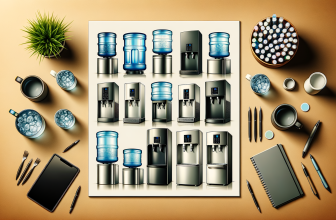
Imagine never running out of hot water in the middle of your shower, or instantly having warm water ready for cooking or cleaning. Sound appealing? This is the daily reality for those who have embraced the benefits of tankless water heaters. Unlike traditional tank water heaters that constantly heat and reheat water to keep it hot, tankless units precisely heat water on-demand, providing a continuous supply. In this article, we’ll dive into the details of the best tankless water heaters on the market to help you select the perfect one for your home.
Our Top Picks
Our #1 Top Pick: Rinnai RUC98iN Ultra Series Natural Gas Tankless Water Heater
As a leading contender in the world of tankless water heaters, the Rinnai RUC98iN stands out for its exceptional efficiency and performance. One of its most appealing features is the Ultra-Low NOx emissions, making it an environmentally friendly choice for the eco-conscious homeowner. With a generous flow rate of up to 9.8 gallons per minute (GPM), it can easily manage the hot water demands of a busy household. Plus, its capability for indoor installation means it doesn’t take up valuable outdoor space.
On the technical side, the dual venting options make the RUC98iN remarkably versatile. Its Condensing Technology ensures that energy consumption remains low, which translates into savings on utility bills. Though more expensive than some models, its top-notch reliability and performance provide a return on investment over time.
Pick #2: Stiebel Eltron Tempra 24 Plus Electric Tankless Water Heater
Ideal for those seeking a dependable electric tankless water heater, the Stiebel Eltron Tempra 24 Plus has earned its place on the list. Its Advanced Flow Control technology automatically adjusts the flow of water to maintain consistent temperature output, eliminating those dreaded cold surprise bursts in the shower. Installation is straightforward since it doesn’t require venting, making it a more versatile choice for different home layouts.
The sleek and compact design of the Tempra 24 Plus is another plus, allowing it to be installed unobtrusively in various locations. It’s equipped to provide enough hot water for homes with moderate demand, supporting multiple showers or appliances simultaneously. Those considering an eco-friendlier choice will also appreciate that it operates without venting gases and at a high level of efficiency.
Pick #3: Rheem RTEX-18 Electric Residential Tankless Water Heater
Rheem has long been a trusted name in water heating, and the RTEX-18 model upholds the brand’s reputation. Designed for simplicity and efficiency, this electric tankless water heater boasts a 4.4 GPM flow rate, making it suitable for most small to medium-sized homes. It offers continuous hot water with easy-to-adjust digital temperature controls, ensuring convenience and precision for its users.
Installation is user-friendly, which could translate to reduced setup costs if you’re somewhat handy. The self-modulation system is another standout feature, as it adjusts energy usage to precisely match hot water demand, often leading to noticeable savings on the electricity bill.
Pick #4: EcoSmart ECO 27 Electric Tankless Water Heater
For a blend of efficiency and smart design, the EcoSmart ECO 27 is a great pick. This unit impresses with its self-modulating technology, which adjusts energy based on how much hot water is needed. In warmer climates, it can handle multiple showers and a sink running simultaneously, while in colder areas, it still provides hot water with efficiency, although for fewer applications at once.
The digital temperature control allows increments of 1-degree, providing exact control over water temperature. Its compact size is a significant advantage for homes with limited space. Although electric tankless water heaters are generally not as powerful as gas models, the EcoSmart ECO 27 is a strong contender for those living in areas without gas service or preferring an electric model.
Pick #5: Takagi T-KJr2-IN-NG Indoor Tankless Water Heater
Takagi’s T-KJr2-IN-NG is the perfect solution for homeowners who need a smaller-scale yet powerful natural gas tankless water heater. With a 6.6 GPM flow rate, it’s specifically designed to fit in tighter spaces without sacrificing performance. It’s often recommended for apartments or smaller homes that still want the benefits of on-demand hot water without the bulkier footprint.
Although it may not support as many simultaneous applications as larger models, the Takagi T-KJr2-IN-NG excels within its capacity. The fully modulating gas valve ensures you’re not using more energy than necessary, helping to keep those gas bills in check. Plus, its safety features, including an air-fuel ratio (AFR) sensor and an exhaust and water temperature safety control, make it a trustworthy option for families.
What to Know Before You Buy
- Electrical Requirements: Electric tankless water heaters often require substantial electrical supply and may need additional circuit breakers or a panel upgrade. It’s important to check your home’s electrical capacity before deciding on an electric model.
- Gas Lines: If you’re opting for a gas-powered tankless water heater, ensure that your existing gas lines can handle the additional load. Some units may necessitate larger lines for adequate fuel supply.
- Venting: For gas-fired tankless water heaters, proper venting is crucial for safety and efficiency. Make sure you have the right setup for the specific venting requirements of the unit you’re considering.
- Flow Rate: Be aware of the flow rate you’ll need based on the size of your home and the average number of appliances you’ll be using simultaneously. A higher GPM (gallons per minute) rating means the water heater can handle more demand.
- Climate: The temperature of the incoming water affects the heater’s performance. In colder regions, heating the water may require more energy, affecting efficiency.
Factors to Consider Before Buying
- Size and Capacity: Assess the physical space where you plan to install the heater, as well as the demand it needs to meet. Larger families or homes with higher water usage will require a unit with higher GPM ratings.
- Energy Efficiency: Look for units with high-energy efficiency ratings to save on operating costs. Consider both the Energy Factor (EF) and the Uniform Energy Factor (UEF) ratings.
- Digital Features: Digital controls and displays can make temperature adjustments and monitoring more precise and user-friendly. Determine if this is a priority for your convenience.
- Reliability: Choose brands with proven track records for durability and customer satisfaction. Reviews and warranty offers can give you insight into the reliability of different models.
- Installation Costs: Factor in installation costs, which can vary widely depending on the complexity of the setup and your home’s existing infrastructure. Professional installation ensures safety and adherence to warranty terms.
- Maintenance: Some tankless water heaters require regular maintenance, such as flushing the system to remove mineral buildup, especially in areas with hard water. Be prepared for the maintenance needs of your chosen model.
Why Trust ChooseRight?
You might be wondering why you should trust our product recommendations. At ChooseRight, our mission is to help you make informed decisions with confidence. To ensure we’re suggesting the best tankless water heaters available, we’ve meticulously reviewed various models, poured through thousands of user reviews, and sought feedback from licensed professionals in the plumbing and heating industry. We hold ourselves to strict criteria of efficiency, reliability, and user satisfaction when curating our top picks, so you know you’re getting advice based on comprehensive research and a true understanding of the products.
Finishing Thoughts
Investing in a tankless water heater can be a transformative choice for your home’s comfort and efficiency. With the myriad options available, it’s crucial to assess your home’s requirements, energy preferences, and installation considerations to find the perfect fit. Take your time exploring the top picks and detailed guidelines provided so that you can enjoy the endless hot water, reduced energy consumption, and the peace of mind that comes with a well-chosen tankless water heater. Whether you prioritize eco-friendliness, digital precision, or raw performance, there’s a model out there to meet your needs and exceed your expectations.
“`html
Frequently Asked Questions
What are the main advantages of using a tankless water heater?
Tankless water heaters offer several benefits, including continuous hot water supply, energy efficiency since they only heat water on demand, space savings due to their compact size, longer lifespan compared to traditional tank heaters, and potentially lower utility bills over time.
Are tankless water heaters more expensive than traditional ones?
While the initial purchase and installation costs of tankless water heaters can be higher, they may save you money in the long run due to their energy efficiency and longer lifespan.
Can a tankless water heater provide enough hot water for a large family?
Yes, but it is essential to choose a tankless water heater with an appropriate flow rate that matches your household’s hot water demand. Larger families might require a higher-capacity unit or multiple tankless water heaters installed strategically throughout the home.
How long does a tankless water heater last?
Tankless water heaters typically have a longer lifespan than traditional tank water heaters, often lasting 20 years or more with proper maintenance and care.
Does a tankless water heater require special maintenance?
Tankless water heaters do require maintenance to ensure efficiency and longevity. This includes periodic flushing to remove mineral buildup, checking and cleaning air and water filters, and inspecting for any signs of wear or damage.
Are tankless water heaters suitable for cold climates?
Yes, tankless water heaters can operate efficiently in cold climates. However, it is important to select a model designed for low incoming water temperatures and ensure that it is properly installed with adequate insulation to prevent freezing.
Can I install a tankless water heater myself?
While some homeowners may have the necessary skills to install a tankless water heater, it is often recommended to have a professional installation to ensure it meets local building codes, warranty requirements, and to optimize performance and safety.
What size tankless water heater do I need?
The size of the tankless water heater you need depends on the flow rate and temperature rise you require based on your peak hot water use and incoming water temperature. A professional can help you calculate the correct size for your home.
Do tankless water heaters work with existing piping systems?
In many cases, tankless water heaters can be connected to existing piping systems, but modifications may be necessary to accommodate the unit’s water flow rate and venting requirements.
Can tankless water heaters be used with preheated water, such as from solar water heating systems?
Yes, many tankless water heaters can be connected to solar water heating systems or other preheating sources, which can further enhance their efficiency and energy savings. It’s important to consult with a professional to ensure compatibility.
“`







